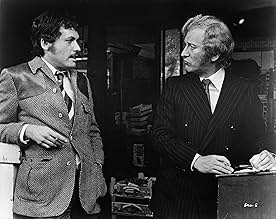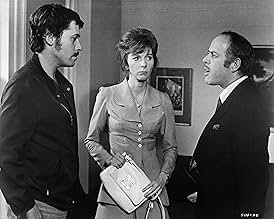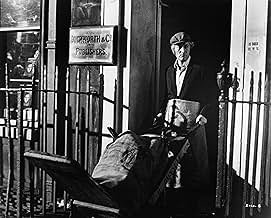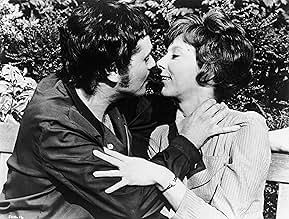A serial murderer is strangling women with a necktie. The London police have a suspect, but he is the wrong man.A serial murderer is strangling women with a necktie. The London police have a suspect, but he is the wrong man.A serial murderer is strangling women with a necktie. The London police have a suspect, but he is the wrong man.
- Director
- Writers
- Stars
- Awards
- 3 wins & 8 nominations total
- Director
- Writers
- All cast & crew
- Production, box office & more at IMDbPro
Featured reviews
A good return to form for the master of suspense, Alfred Hitchcock. Since The Birds in 1963 Hitchcock's movies (Marnie, Torn Curtain and Topaz) had not met with commercial success (though, personally, I think Marnie was great).
Frenzy sees Hitchcock back to doing what he does best - suspenseful murder dramas. Great, intriguing plot with the usual clever direction from Hitchcock. Some of his camera angles and exterior shots are straight from his own book of how imply something and create tension without saying a word, or using manipulative music.
The movie also has some great comedic moments. The Chief Inspector and his wife having dinner were always hilarious.
Much more edgy in terms of nudity and sex than any previous Hitchcock movies. This could be ascribed to censorship restrictions being relaxed. Also tells you what Hitchcock could have done with is movies if all the stupid, puritanical censorship wasn't there all along.
Not as tightly wound as his greats (Rear Window and Psycho especially), so not perfect as far as suspense and enthrallment goes.
Good performance by Jon Finch in the lead role. Good support from Alec McCowen, Barry Foster, Anna Massey and Barbara Leigh-Hunt.
Sadly, this was to be Hitchcock's penultimate movie. His final movie, Family Plot was released four years later, in 1976. He died in 1980.
Frenzy sees Hitchcock back to doing what he does best - suspenseful murder dramas. Great, intriguing plot with the usual clever direction from Hitchcock. Some of his camera angles and exterior shots are straight from his own book of how imply something and create tension without saying a word, or using manipulative music.
The movie also has some great comedic moments. The Chief Inspector and his wife having dinner were always hilarious.
Much more edgy in terms of nudity and sex than any previous Hitchcock movies. This could be ascribed to censorship restrictions being relaxed. Also tells you what Hitchcock could have done with is movies if all the stupid, puritanical censorship wasn't there all along.
Not as tightly wound as his greats (Rear Window and Psycho especially), so not perfect as far as suspense and enthrallment goes.
Good performance by Jon Finch in the lead role. Good support from Alec McCowen, Barry Foster, Anna Massey and Barbara Leigh-Hunt.
Sadly, this was to be Hitchcock's penultimate movie. His final movie, Family Plot was released four years later, in 1976. He died in 1980.
"Frenzy" was Alfred Hitchcock's next-to-last film. And though it's not a great classic like "Psycho" and "North by Northwest", it's still a very good movie. After making mostly American movies for four decades, Hitchcock returned to his native Britain to make "Frenzy". It's about a series of murders that's devastating London. These murders have two things in common: 1) The victims are all women; and 2) they're all raped and then strangled with a neck-tie. When a marriage counselor is murdered this way, the police suspect the woman's ex-husband is the culprit. But actually the husband is innocent, and is forced to hide out from the cops. "Frenzy" has all the usual Hitchcock elements: thrills, suspense, comedy, and Hitchcock's cameo appearence. The two best scenes in the movie are the hilarious moments when the police inspector (who's heading up the investigation of the neck-tie murders) is served two gourmet dinners by his wife. These scenes are very funny. The comic moments is what gives "Frenzy" a edge over Hitchcock's previous film "Topaz". Plus, it's a more entertaining thriller.
*** (out of four)
*** (out of four)
Hitchcock did one hell of a job! I was planning on watching this movie just for about 30 minutes before going to sleep and was gonna finish watching it the next day, but instead I was so engaged that I couldn't stop watching and stayed awake the whole 2 hours. I loved the irony of the actual rapist having no clues pointing to him and the innocent man having all clues pointing to him. The scene involving the rapist in the back of the truck, rummaging through a sack of potatoes (and that's all I'll reveal) is classic suspense. I also loved how Hitchcock left the rape scenes (excluding the first one) up to the imagination. There is a great shot where one of the victims is being raped and we don't even hear any off-screen yells or screams. The camera simply tracks backwards down a staircase and out the front door, where people walk by minding their own business, ignorant to the evil that's being committed a floor above. Any amateurish director would've went for true shock value and showed all the rape scenes in explicit detail. We don't call Hitchcock the master of suspense for nothing. The scene is still quite haunting. In horror and suspense, what you don't see can be a lot more frightening than what you do see, since the imagination is a powerful thing. The last line of the movie should go down in history. It had me bawling with laughter! Just that one line gave perfect closure to this wonderful film.
My score: 8 (out of 10)
My score: 8 (out of 10)
After 30 years in the USA and after the disappointments of "Torn Curtain" (1966) and "Topaz" (1969), Alfred Hitchcock came back to his native Britain for this film -written by Anthony Shaffer from a novel by Arthur La Bern.
"Frenzy" is his penultimate movie, certainly the best one of his last period. The way the Master films is very classic -deliberately old fashioned; at the same time all the charachters are very modern -they belong to a more and more decadent and neurotic London.
Almost from the beginning we know who the criminal is, and Hitchcock enjoys himself in showing how the man tries to escape and how he betrays people. Director's trademarks are also back in force: suspense (a lot!) and humour -more sarcastic and sharper than ever.
For "Frenzy" the Master doesn't get movie stars, instead he chooses local stage actors. In my opinion he does this because, first, he wants the film to be very English. Furthermore, he wants this time more ordinary faces for making the story more shocking (with famous actors in the main roles, the plot -in a certain way- could be identified mostly with them and loose strength, instead Hitchcock avoids that "paradox"...).
Maybe "Frenzy" is not an unforgettable masterpiece like "Psycho", "Vertigo", "Birds" or many other works. But it is a great movie indeed.
"Frenzy" is his penultimate movie, certainly the best one of his last period. The way the Master films is very classic -deliberately old fashioned; at the same time all the charachters are very modern -they belong to a more and more decadent and neurotic London.
Almost from the beginning we know who the criminal is, and Hitchcock enjoys himself in showing how the man tries to escape and how he betrays people. Director's trademarks are also back in force: suspense (a lot!) and humour -more sarcastic and sharper than ever.
For "Frenzy" the Master doesn't get movie stars, instead he chooses local stage actors. In my opinion he does this because, first, he wants the film to be very English. Furthermore, he wants this time more ordinary faces for making the story more shocking (with famous actors in the main roles, the plot -in a certain way- could be identified mostly with them and loose strength, instead Hitchcock avoids that "paradox"...).
Maybe "Frenzy" is not an unforgettable masterpiece like "Psycho", "Vertigo", "Birds" or many other works. But it is a great movie indeed.
This. This is more like it. After the last few Hitchcock films left me wanting a little, FRENZY returns to the type of film that he did so well. The plot is one that he frequently used: an innocent man wrongly accused, but he didn't just rehash old material. He upped his game and brought his filmmaking style into a more modern sensibility, all while maintaining the suspense and black humor that had become his trademarks. While I've yet to see any of the films from his British period, I am aware that FRENZY hearkens back to his first real success, which was THE LODGER. And in terms of what I've actually seen, I noticed a lot of DNA from earlier efforts like SABOTEUR, REAR WINDOW, and PSYCHO. The film grabs you and sucks you in from the opening notes of its title sequence, a fanfare which triumphantly announces that he's back: back in his native England, and back in top form. And it wastes no time in thrusting you into this familiar, yet slightly changed world. One thing that benefits the film a lot is the screenplay by Anthony Shaffer, which is filled with great dialogue and biting wit. There was also a sinister, Victorian elegance to the score. And, as with all of his other films, there are a few sequences which stand out. The best of these is probably a long, continuous shot which pulls back from the scene of a crime as Hitchcock leaves it (and its aftermath) to the audience's imagination. Still, perhaps in concession to the changing times, this film does contain some nude scenes and somewhat more vicious-minded, if not particularly graphic, violence. It reminds us that the gory details are often best left to the imagination; they're the icing on the cake, and not the cake itself. Another audacious thing Hitchcock does is make the protagonist rather unlikeable and have us sympathize (at least in one protracted scene) with the villain. Overall, I thought that he was in top form here, adeptly mixing suspense and comedy, all while exploring his favorite themes of sex, death, and food. In regards to food, the Chief Inspector's wife has perhaps a couple of the funniest scenes in the whole film. For me, FRENZY was a welcome return to form after the last few misfires, and it's great that Hitch seems to be going out on top.
Did you know
- TriviaAlfred Hitchcock originally planned to do his cameo as the body floating in the river. A dummy was even constructed to do the shot. The plans were changed and a female body, a victim of the Necktie Murderer, was used instead. Hitchcock instead became one of the members of the crowd who are listening to the speaker on the river bank. The dummy of Hitchcock was used in the typically humorous trailer hosted by Hitchcock.
- GoofsWhen examining the murder scene at the marriage bureau, a police officer brings the victim's handbag out to Inspector Oxford, who correctly holds it with a handkerchief to keep his fingerprints from contaminating the evidence. He then he sticks his ungloved hand inside and feels around, thus contaminating it with his own fingerprints.
- Quotes
[last lines]
Chief Inspector Oxford: Mr. Rusk, you're not wearing your tie.
[Robert Rusk is speechless for a moment]
Robert Rusk: I...
[he drops the trunk that he has just dragged into the room]
- Crazy creditsThe Universal Pictures logo does not appear on this film.
- Alternate versionsThe original UK cinema and initial 1989 CIC video releases were cut by 19 secs by the BBFC to remove shots of underwear removal and closeups of neck strangling from the murder scene. The cuts were restored in all later Universal video and DVD releases.
- ConnectionsFeatured in The Dick Cavett Show: Alfred Hitchcock (1972)
- How long is Frenzy?Powered by Alexa
Details
- Release date
- Country of origin
- Language
- Also known as
- Frenesí
- Filming locations
- The Globe pub, Bow Street, Covent Garden, London, England, UK(pub where Blaney, Babs and Forsythe work)
- Production company
- See more company credits at IMDbPro
Box office
- Budget
- $2,000,000 (estimated)
- Gross worldwide
- $4,940
- Runtime
- 1h 56m(116 min)
- Aspect ratio
- 1.85 : 1
Contribute to this page
Suggest an edit or add missing content























